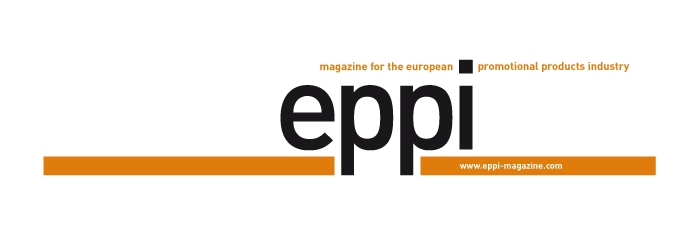The year is coming to a close – and as usual eppi magazine asked promotional products professionals all over Europe for their conclusions. The dominating themes in 2019: Sustainability, digitalisation and a demanding day-to-day business that is characterised by global upheavals and the initial signs of an impending recession.
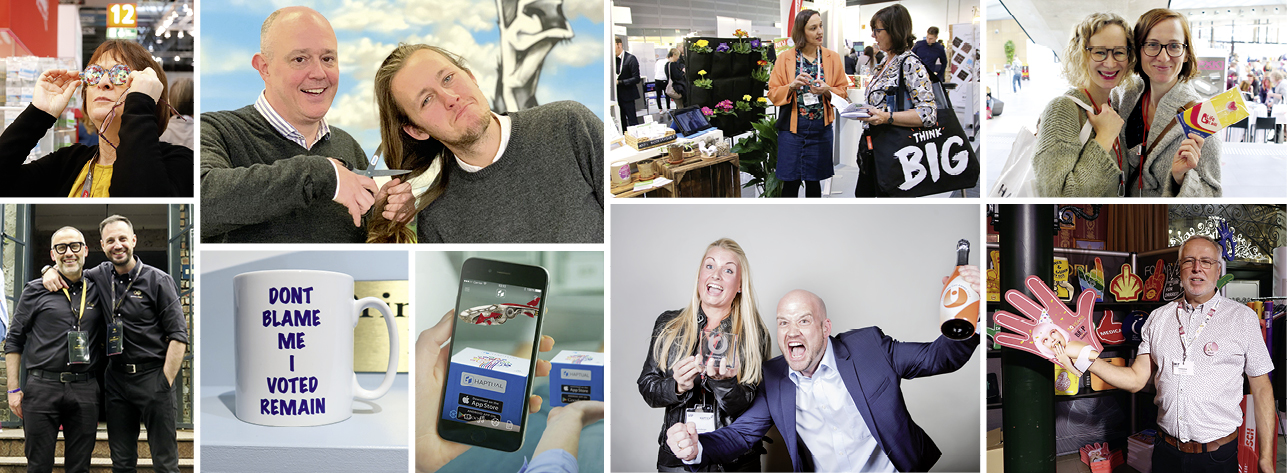
Year after year one of the rituals of the end-of-the-year review is to select historical chronicles or celebrities, who have shaped the time and who stand for significant events. One can indeed officially place bets on who the famous “Person of the Year” of Time Magazine is going to be, which this year the publication is going to announce on December 11. Working out who is leading the rankings so far, isn’t that difficult even without taking a look at the relevant betting sites. The odds of a petite, 16-year-old school girl from Sweden are much better than those of Donald Trump, Angela Merkel, Elon Musk or Xi Jinping, even if they are also among the favourites: With her school strikes for the climate, Greta Thunberg has triggered off a global movement, which is incomparable in recent history. Whether admirers, supporters, critics or trolls – nobody got around Fridays for Future in 2019. And hence the wave that Greta Thunberg set in motion has also taken the promotional products industry by storm and has brought the sustainability debate that has been ongoing for years up to a new level. Discussions on more climate protection, more sustainability in everyday (business) life and within the global supply chains, about the sense and nonsense of individual product groups were held everywhere and they were much more serious than hitherto. “Sustainability is without doubt the most important question that is occupying our industry at the moment” (Cecilia Grahn-Nyd, MEC Group), “Sustainability is the talk of the town. We have sold more eco-friendly items than ever before” (Federico Vitolo, NBL Vitolo), “Sustainability is not only a hype, but indeed a necessary consequence now and in the future to sell promotional products with a clear conscious” (Sönke Hinrichs, Inspirion).
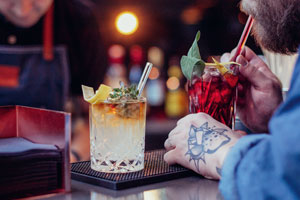
With plastic products under criticism, the industry came up with alternatives such as drinking straws made of glass.
Just over a decade after the promotional products industry started to seriously think about its environmental and social practices on a wide-scale basis, one has the impression that the mega trend sustainability has now really arrived in the world of haptic advertising. On the one hand at product level – there is a very good and wide selection of environmentally-friendly and fairly-produced items on the market today, which not only deserve the label “sustainable”, but also make their origin transparent. “Nowadays, all of our supplier partners seem to have eco-friendly items among their product ranges” (Emma Reynolds, Outstanding Branding), “We strive to achieve real sustainability, not greenwashing” (Bas Lensen, Toppoint). On the other hand, as far as internal processes are concerned a system change-over has occurred – in the meantime the voluntary compensation of transport or production-caused emissions is matter of course. Sönke Hinrichs (Inspirion) confirmed that “Oeko-Tex dyes are implemented for the printing process, solar energy in the printing shop in Hungary, the paper consumption of paper in the offices and the amount of plastic used reduced. Federico Vitolo (NBL Vitolo) is “dispensing with the implementation of water in PET bottles within the company.” Others provide their employees with e-bikes, are maintaining beehives or planting insect meadows on their premises.
Transparency and educational work
All of these measures and changes are urgently necessary – not only regarding the environment, climate and more social justice, but also for the company’s own survival. Namely, sustainability is also a top priority for the end users. “Whereas up until recently exclusively the price played a role, completely different issues are now relevant when selecting promotional products, such as for instance certifications, sustainability and product safety” (Markus Angermayr, Forum Werbemittel). Many buyers and decision-makers in the advertising companies are meanwhile wellinformed, question greenwashing, want to be on the safe side. “Certificates and social audits are a necessary prerequisite for us to be able to trade on the European promotional products market” (Civan Mert Inci, Novex), “We would have lost several orders if we hadn’t had the corresponding certificates” (Łukasz Makowski, DreamPen). However, it doesn’t always suffice to make one’s own company and product portfolio more sustainable and document this because in the wake of more extensive sustainability strategies on the part of the users and a public discourse that is sometimes more emotional than fact-based, occasionally whole product groups fall under general suspicion – even if they are not per se “dirty”. The plastic products and manufacturers were under the line of fire more than ever in 2019, the EU’s plastic ban, which forbids a host of disposable products made of plastic from 2021 onwards, was a frequent topic of conversation. “Disposable plastic has become an absolute no-go for our customers” (Frank Murphy, GeigerBTC) Some users even explained that they are not going to implement any promotional products made of plastic anymore.
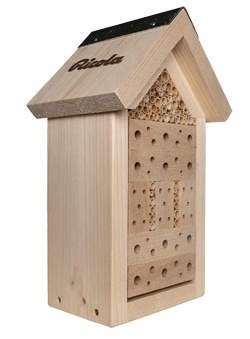
Some articles picked up on the discussion about insect mortality.
As always, the industry immediately provided alternatives – from straws made of steel, through to bags for tops made of cotton. However, the explanatory work and informative activities are much more important – by no means just for the plastic manufacturers. It’s all about eliminating prejudices, delivering facts and above all ensuring one is credible. Because the worst case scenario could mean the end users – be it for reasons of insecurity or lacking knowledge – simply don’t implement haptic advertising at all in future. How existential the sustainability issue is for many promotional products players is reflected by the fact that the discussion about environmental themes is not always held objectively within the industry, but sometimes instead polemically. It seems that the promotional products sector is not being spared from the zeitgeist, where tempers can flare up quickly. This is hardly surprising considering so many themes have a direct, political association and in times when worldwide upheavals with wide-ranging consequences are occurring.
Riots, Brexit, trade wars
In this way, Fridays for Future was not the only protest movement that was to have consequences for the promotional products industry in 2019 – one only has to think about the ongoing unrest in Hong Kong for example. Visitors to the autumn shows reported about visibly empty exhibition halls, about hotels where in some cases only a quarter of the rooms were occupied and about delays in the procurement of samples or processes that are wound up by procurement and QC offices in Hong Kong. Violent disputes raged in Europe this year, i.e. in Barcelona and some entrepreneurs are feeling the side-effects of the troubled, political situation in Catalonia. “We received a call and also a very unpleasant e-mail from Spanish customers, who stopped buying from us” (Joan Pera, Arpe Barcelona), “The B2C companies in Barcelona are being hugely affected by the political crisis” (Rafael García, Promosistem) In the United Kingdom meanwhile not only the heads of the members of the House of Commons were spinning in 2019, but also the promotional products specialists on both sides of the English Channel are asking themselves which impact Brexit – if it ever happens – will have on pan-European trade. “The never-ending story of Brexit basically immobilizes any strategy roll-out for the UK market” (Alexandre Gil, Stricker), “As possible consequences of a no-deal Brexit, our FedEx shipment times might increase initially by one or two days and the cost of doing business in the UK could increase by up to 5%” (Colin Loughran, Goldstar Europe).
Of course, the British companies are affected most. After decades of free trade within the EU they are having to occupying themselves again with customs regulations and procedures. The BPMA (British Promotional Merchandise Association) is urgently advising its members to secure themselves logistics partners and customs agencies – because in the wake of Brexit these will be hopelessly overloaded with work. The list of challenges that the British distributors and suppliers are faced with ranges from the basics such as the question as to with which country which trade agreement exists or the annoying fact that the GDPR – actually an issue that has already been concluded – will have to be re-addressed due to Great Britain’s status change into a third country, through to “details” such as how enough room will be found on products or packaging for both the CE label and the British equivalent, the UKCA, which will replace the CE after Brexit.
Indeed many of the British firms are in the meantime well-prepared for Brexit and have where possible taken the respective measures. “Our logistics centre in the Netherlands is geared up and our transport and financial teams are well-prepared” (Frank Murphy, GeigerBTC). However, this doesn’t change the fact that the country’s leaving the EU will disrupt the international trade and cause unrest on the financial markets – as if there aren’t enough turbulences already, to mention the ongoing trade war between China and the USA as just one issue. “Not only the industries directly affected by the trade war measures are causing global disruption, but also the downstream industries” (Geanina Ioan, Chilli Ideas). Hence, the tension and the fear of a new recession is also increasing within the promotional products market. The wide-ranging optimism that prevailed within the industry two or three years ago, noticeable faded in 2019, more and more people are talking about a stagnation. “I fear the economy is going to slow down, I hope this will not turn into a recession” (Joan Pera, Arpe), “It is disturbing if Germany shows signs of weakness – politically, structurally and economically speaking – as was recently the case” (Magali Chéchin, European Sourcing), “Sweden is most probably standing on the threshold of a recession” (Cecilia Grahn-Nyd, MEC Group).
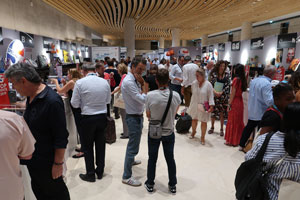
For the first time, the Premium Sourcing took place at the Louvre.
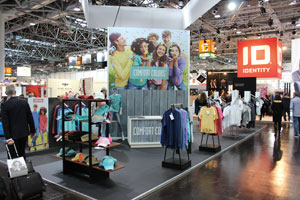
The premiere of the new trade show trio PSI, PromoTex Expo (photo) and viscom met with mixed reactions.
As if one didn’t already have enough to do, because the day-to-day business keeps both the distributors and the suppliers on their toes. The challenge entails satisfying the growing demands of the end users and keeping pace with the speed of the hyper-networked global economy and technological developments. “The Daft Punk lyrics come to mind – how do we become even ‘better, faster, stronger’ in the way we support our distribution partners?” (Colin Loughran, Goldstar Europe), “Short delivery times continue to be a hot topic within the industry and this presupposes more flexibility and faster service” (Bas Lensen, Toppoint).
As such the digitalisation, which many promotional products players are pushing at a fast pace with a huge investment of financial and personnel sources, is still at the top of the priority list. Online platforms, internal processes, customer management and production – there is hardly a business area that is not affected by the digital transformation and which has to be made correspondingly fit. “This year, we have heavily invested in our website, ERP and CRM, which underlines how highly we evaluate the importance of the digitalisation of our industry.” (Alexandre Gil, Paul Stricker), “We have made large investments in these three areas so that we are geared up for the next five years” (Thibault Fontaine, mcs Kick & Rush).
Whereby it is not only about staying competitive, but also about living up to the expectations of the users – many of whom are millennials. “We won’t have a future if we don’t invest in digitalisation and the opportunities are there for those, who adapt to it faster” (Geanina Ioan, Chilli Ideas) “A clean and professional B2B platform is an absolute must in the portfolio of the promotional products distributor today” (Markus Angermayr, Forum Werbemittel). For the promotional products industry in particular the interfaces between ERP systems, web shops and other infrastructures proved to be stumbling blocks. The preparation of product data for clean, errorfree workflows is a mammoth job. “Processing the data sets of our various suppliers so that they are compatible with our databases entails high financial costs for us” (Liselotte Leijten-Deppenbroek, Pinkcube), “Only few industries offer such a variety of products and product models and the challenge for us lies in offering this complex data in its entirety” (Magali Chéchin, European Sourcing). Which is all the more reason why one has to simultaneously consider how the digital architectures for the promotional products users have to be designed. Because in times when the industry structures are undergoing huge shifts the end users are in the same boat – at least as far as the target group address is concerned.

As the never-ending story of Brexit goes on, British companies are preparing themselves for leaving the EU.
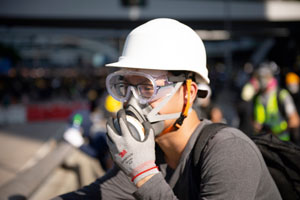
Less visitors at the Autumn shows, empty hotels, delays in order processing: the ongoing riots in Hong Kong had consequences.
A question that not least the exhibition organisers have to deal with in detail. “It is without doubt more a question of in what way rather than whether end users should be present at important industry events or not” (Magali Chéchin, European Sourcing). Whereas in parts of the European market strictly closed-shop structures are being upheld, in other places the end users have long since been wandering down the aisles – for the past few years even officially at the PSI Show, which is granting access to the show to end users by invitation of distributors on all three days in 2020, instead of on just one day as was previously the case. Whether the PSI is the right platform to allow the participation of industry buyers remained a hotly discussed issue with varying opinions once again in 2019. The opinions are also divided about the new trade fair amalgamation comprising of the PSI, PromoTex Expo and viscom, which was staged at the beginning of 2019 for the first time. The PSI Show definitely doesn’t seem to be strengthening its own image with the trade show trio. In any case, several of the major industry players evidently consider the self-proclaimed “leading European trade show” of the promotional products industry to be dispensable at present and have announced their absence for 2020 explaining that for the time being they intend to invest in other marketing measures.
The latter is – beyond the PSI discussion – perhaps also symptomatic for an era, when a wide number of communication channels online and offline are available and while at the same time the marketing budgets are coming under extreme pressure. Many market players are thus analysing their marketing activities very carefully and spend a lot of time weighing up how much they invest in which platforms. This also and particularly applies for the end users, who check each marketing measure twofold and threefold – including the question as to whether and if so, which haptic advertising products they are going to implement. “Companies want to buy lower quantities, but better products. Our industry has to adjust to this quickly and show that it doesn’t produce throw-away items, but instead useful promotional messengers for corporate communications” (Thibault Fontaine, mcs Kick & Rush).
Nevertheless, precisely this situation provides a huge opportunity – for suppliers, who offer high-quality, functional and sustainable products and for promotional products agencies, who take their role as consultants and troubleshooters seriously. “For our clients, we are an advertising agency that needs to understand their brief and particular needs” (Geanina Ioan, Chilli Ideas), “We have to make it clear to the buyers how efficiently product media works if implemented correctly” (Cecilia Grahn-Nyd, MEC Group) However, it seems that the promotional products industry has done its homework over the past years. Many promotional products distributors are actually ascertaining that the image of the promotional product is noticeably improving. “I think haptic advertising will play an increased role in the marketing mix of the customers in future” (Markus Angermayr, Forum Werbemittel). That is one reason for looking optimistically ahead to the New Year – and not the worst position to encounter economic stagnation, should it occur.
// Till Barth
Photos: © WA Media (9); Halm (1); Orcas (1); Outstanding Branding (1); Ricola (1); Shutterstock (2)


